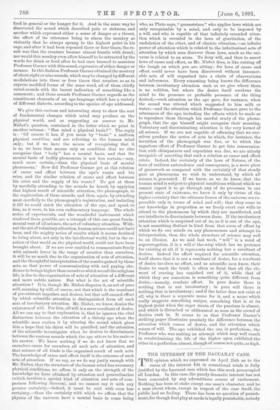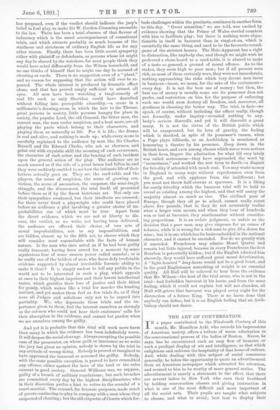THE INTEREST IN THE BACCARAT CASE.
THE opinion which we expressed on April 25th as to the cause of the interest felt in sensational trials is fully justified by the baccarat case which has this week preoccupied all London. In this case, the purely dramatic interest has not been concealed by any adventitious source of excitement. Nothing has been at stake except one man's character, and he a man about whom, except in respect of the case itself, the public had no feeling. There has been no question of punish- ment, for though foul play at cards is legally punishable, nobody has proposed, even if the verdict should indicate the jury's belief in foul play, to make Sir W. Gordon-Cumming amenable to the law. There has been a total absence of that flavour of indecency which is the usual accompaniment of sensational trials, and which attracts probably as much because of the staidness and strictness of ordinary English life as for any other reason. Finally, there has been little secret sympathy either with plaintiff or defendants, as persons whose lot might any day be shared by the watchers, for most people think they would have acted differently from the Wilson household, and no one thinks of himself that he might one day be accused of cheating at cards. There is no suggestion even of a "plant," and no reason for supposing that the action will ever be re- peated. The whole interest is produced by dramatic effect -alone, and that has proved amply sufficient to attract all eyes. All men have been watching a tragi-comedy of real life such as only Sheridan could have described without falling into perceptible absurdity,—a scene in a millionaire's drawing-room, in which the heir to the Throne, great persons in society, little persons hungry for place in society, the popular Lord, the old General, the bitter man, the correct man, the man under suspicion, and a host more, are all playing the parts which belong to their characters, and playing them as naturally as life. For it is life ; the drama is real and alive, and nothing is made up ; while every scene is carefully explained to the audience by men like Sir Charles Russell and Sir Edward Clarke, who act as choruses, and point out with exquisite skill the meaning of each occurrence, -the character of each actor, and the bearing of each incident upon the general action of the play. The audience are as much amused as if the side of a great house had fallen in, and they were suddenly enabled to see how the intimate life of their betters actually goes on. They see the card-table and the players, the scene of suspicion, the scene of growing con- viction, the scene of aecusation, the suspense, the semi-tragic struggle, and the dgnouement, the trial itself, all presented before them as if by the finest histrionic art. Not only are their sympathies awakened, but their intellects are aroused; for there never lived a playwright who could have placed before an audience a plot involving a greater choice of im- probabilities one of which most be true. Apart from the direct evidence, which we are not at liberty to dis- cuss, the verdict, as we write, not having been delivered, the audience are offered their choice . of two sets of moral improbabilities, not to say impossibilities, and are bidden, almost up to the fifth act, to choose which they will consider most reconcilable with the facts of human nature. Is the man who once acted as if he had been guilty -really innocent, having been cowed for a moment by some mysterious fear of some unseen power called scandal ; or is he really one of the boldest of men, who dares defy irrefutable evidence supported by almost irresistible forensic ability to make it clear P It is simply useless to tell any public in the world not to be interested in such a play, which appeals at once to their highest impulses and their lowest intellectual tastes, which gratifies their love of justice and their thirst for gossip, which wakes like a trial for murder the hunting instinct, and yet makes them feel as few trials do, as if they were all Judges and solicitous only not to be argued into partiality. We, who deprecate these trials and the im- portance given to them, feel the interest ourselves as strongly as the cabmen who could not bear their customers' calls for their absorption in the evidence, and cannot but pardon when we see ourselves among the guilty.
And yet it is probable that this trial will work more harm than many in which the evidence has been indefinitely worse. It will deepen the social cleavage. Always excepting the possible case of the prosecutor, on whose guilt or innocence as we write the jury has given no opinion, nobody is shown by the trial in any attitude of wrong-doing. Nobody is proved or imagined to have oppressed the innocent or screened the guilty. Nobody, with the same possible exception, is proved to have committed any offence, either against the laws of the land or the rules current in good society. General Williams was, we suppose, guilty of a breach of military regulations ; but such breaches are committed every day by the highest disciplinarians, who in their discretion prefer a hint to retire to the scandal of a court-martial. The counsel, for forensic purposes, made much of guests continuing to play in company with a man whom they suspected of cheating ; but the old etiquette of Courts which for-
bade challenges within the precincts, continues in another form to this day. "Great sensation," we are told, was excited by evidence showing that the Prince of Wales carried counters with him to facilitate play; but there is nothing more objec- tionable in itself in baccarat than in vingt-et-un, which is essentially the same thing, and used to be the favourite round- game of the strictest houses. The Heir-Apparent has a right to distraction, like anybody else, and though we might wish he preferred a chess-board to a card-table, it is absurd to make of a taste so general, a ground of moral offence. As to the stakes, they seem high to poor men; but if all present were rich, as most of them certainly were, they were not immoderate, nothing approaching the risks which very decent men incur in business—incur, we mean, for the sake of the excitement— every day. It is not the best use of money ; but then, the best use of money is usually some use its possessor does not prefer, and restriction on him for the purpose of enforcing such use would soon destroy all freedom, and, moreover, all goodness in choosing the better way. The trial, in fact—we speak, of course, without including the officer really, though not formally, under inquiry—revealed nothing to any- body's serious discredit, and yet it will discredit a great many. It is not the virtue of the British public which will be exasperated, but its love of gravity, the feeling which is shocked, in spite of its possessor's reason, when a Pope plays billiards, or an Archbishop is mentioned as honouring a theatre by his presence. Deep down in the British heart, and even among classes which never were serious in their lives, lingers the admiration for what till very lately was called seriousness—they have superseded the word by "earnestness," and worked the new term to death—a disgust for frivolity if attended with much cost. You may waste money in England in many ways without reprehension even from the good, and with applause from the indifferent; but you must not throw half-crowns at sparrows. It is a liking for costly frivolity which the baccarat trial will be held to reveal as existing among the highest, and that will annoy the majority almost as much as vice. The civilised poor of Europe, though they all go to school, cannot really count above five pounds, that is, they do not accurately realise what a larger sum means, and when they hear of hundreds won or lost at baccarat, they anathematise without consider- ing proportions. It is an unfair judgment, as unfair as the decision that a poor man may give sixpence for an ounce of tobacco, while it is wrong for a rich man to give g6 a dozen for wine; but it is one which has its basis embedded in the national character, and it cannot be amended. Nor do we greatly wish it amended. Frenchmen may admire Henri Quatro and remain but little injured, because in every Frenchman the first Bourbon is potentially hidden; but if the English admired him sincerely, they would have suffered great moral deterioration. A " light-hearted " dray-horse would not be a good beast, and in the good Englishman something of weight is an essential quality. All Hull will be relieved to hear from the evidence that Mr. Wilson—the host of the trial scene, who is not in the trial—had forbidden baccarat in his house, and from the same feeling, which it could not explain but will not abandon, all Hull will grieve that baccarat was played every night for the distraction of a future King. There is no harm done that anybody can define, but it is an English feeling that an Arch- bishop should not dance.







































 Previous page
Previous page